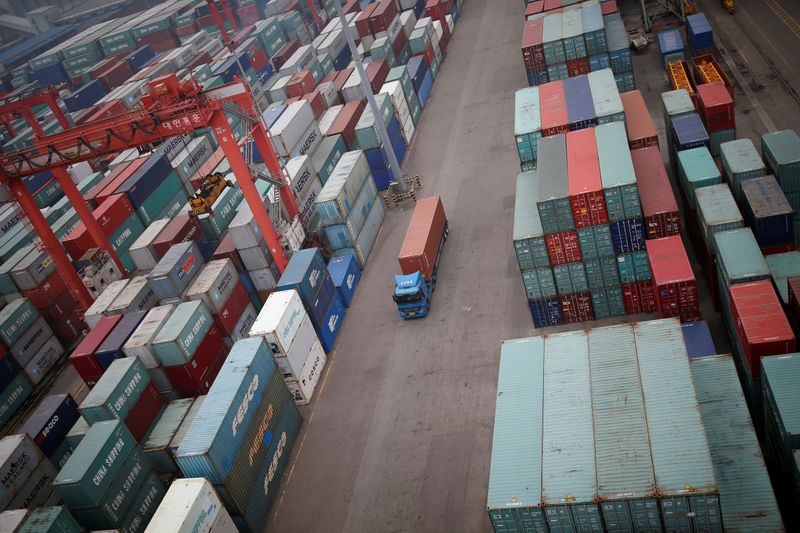By Joori Roh and Cynthia Kim
SEOUL (Reuters) - South Korean exports snapped a 14-month losing streak in February thanks to more working days this year compared to last, although evidence of disruptions from the coronavirus were reflected outside the headline figures.
South Korea's monthly trade data, the first to be released among major exporting economies, provides an early guide to the health of global trade already taking a hit from the epidemic.
Overall shipments in February rose 4.5% year-on-year, trade ministry data showed on Sunday, beating a median forecast of a 3.4% rise, given 3.5 more working days from a year earlier. This compares with a 6.3% decline in January due to the Lunar New Year, a holiday which fell in February last year.
Average exports per working day, however, tumbled 11.7%, the steepest decline in three months, and a big swing from a 4.6% increase in January.
Exports to China dropped 6.6% from a year earlier, after falling 3.7% for the Feb. 1-20 period, but average exports to China per working day plunged 21.1%, the ministry said.
This follows data on Saturday that showed factory activity in China contracted at its fastest ever in February, even worse than during the global financial crisis of 2008.
"Per-day exports were seen subdued especially in the second half of February," said Lee Sang-jae, chief economist at Eugene Investment & Securities, noting that it's not over.
"If the decline in February was mainly driven by sapping Chinese demand, exports would fall even worse in March and April as negative perceptions over Made-in-Korea products spread," he said.
But a rise in chip demand and prices, and increased sales to other countries including the United States, were expected to partially negate impact from the coronavirus.
A breakdown of the South Korea trade data showed February's overseas sales of memory chips and car components rose 9.4% and 10.0%, respectively, from a year earlier.
WORSE TO COME
South Korea on Sunday reported 376 new infections, raising its tally to more than 3,500, the highest outside China. On Saturday, South Korea recorded its biggest daily jump in cases so far.
"Economic impact from the spread of the coronavirus is expected to be greater than in SARS," said Sung Yoon-mo, the South Korean industry minister, adding that he expects further economic consequence in March.
Economists are also concerned over whether temporary factory shutdowns at major companies will further weigh on Asia's fourth-largest economy.
"Worse is yet to come if major exporting companies start shutting down their factories temporarily in the wake of the spike in domestic infections," Meritz Securities' chief economist, Lee Seung-hoon, said.
Hyundai Motor Co (KS:005380) suspended operations at one of its factories after a worker tested positive for the virus, and LG Display (KS:034220) has shut a display module plant for disinfection work until Tuesday.
A survey from the central bank showed business sentiment suffered its worst fall in nearly 17 years, even before the spike in national infections.
Global investment banks now see South Korea's economy growing at a slower pace than last year's 2.0%.
Last week, the Bank of Korea kept interest rates unchanged, while raising the ceiling for its special loans programme to 30 trillion won ($25 billion) to extend support for sectors hit by the virus.

The finance ministry said on Friday a supplementary budget due next week to cushion the economic hit of the coronavirus will be larger than the 11.6 trillion won package spent during the 2015 MERS outbreak.